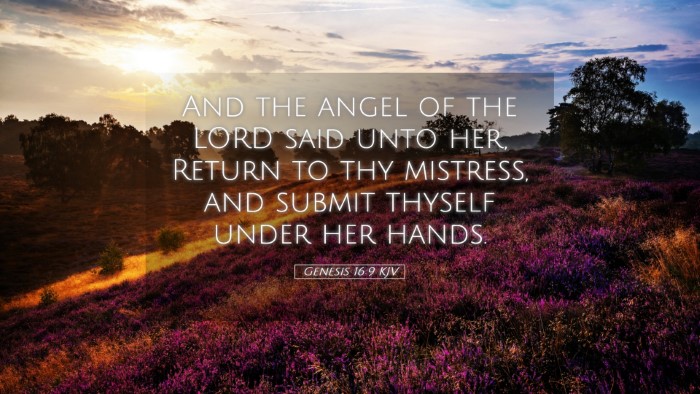Bible Commentary on Genesis 16:9
Verse: "And the angel of the LORD said unto her, Return to thy mistress, and submit thyself under her hands."
Introduction
This verse acts as a pivotal point in the narrative surrounding Hagar, serving as a profound reflection on divine intervention and obedience. It is crucial to explore the theological implications, historical context, and practical applications drawn from the insights of prominent biblical commentators such as Matthew Henry, Albert Barnes, and Adam Clarke.
Contextual Analysis
To fully appreciate Genesis 16:9, we must consider the circumstances surrounding Hagar’s plight. Hagar, an Egyptian servant of Sarah, found herself in a position of despair. Sarah, unable to bear children, offered Hagar to Abraham to bear a child, which led to internal conflict and strife.
Matthew Henry's Commentary
Matthew Henry emphasizes the significance of the angel's command as a combination of both divine authority and mercy. He points out that Hagar's encounter with the angel reveals God’s concern for her. Here, Henry notes:
- The angel's directive to "return" signifies an important act of restoration. Hagar’s return under the oppressive circumstances of servitude was not merely a return to her previous state but a call to a transformative experience of humility and faith.
- Henry notes the importance of submission. To submit under Sarah's hands represents an essential aspect of living by divine order, despite the personal suffering it may involve.
Albert Barnes' Commentary
Albert Barnes provides practical reflections on the nature of God's command in this verse. He highlights two key aspects:
- Divine Direction: Barnes reflects on how God's instructions, even if difficult, are ultimately for a greater purpose. Hagar was not abandoned in her distress but was instead directed back to a situation where her faith would be tested and refined.
- Importance of Obedience: Barnes stresses that obedience to God's commands is crucial. Hagar’s submission is portrayed not as blind servitude but as a potent act of faith, trusting in God’s overarching plan for her life and the life of her child.
Adam Clarke's Commentary
Adam Clarke provides an in-depth look at Hagar's identity and her role in the covenant story. He offers insights into:
- God’s Inclusivity: Clarke draws attention to the fact that Hagar, an Egyptian and a servant, is included in God’s plans. This divine interaction signifies that God's concern transcends social and cultural boundaries, honoring the marginalized in society.
- Moral and Spiritual Growth: Clarke contends that Hagar’s return was not just physical but also a journey towards spiritual maturity. By yielding to God's command, she would experience divine favor and the unfolding of her son's destiny—becoming the progenitor of a great nation.
Theological Implications
This verse prompts several theological reflections that are crucial for pastors, students, and theologians alike:
- Divine Providence: The intervention of the angel indicates God’s active role in human affairs, emphasizing that He guides those in distress back to the paths of His will.
- The Role of Submission: Submission is often viewed negatively in modern contexts, but in this scenario, it is presented as a pathway to fulfilling God's purposes, encouraging believers to trust in divine wisdom over personal inclinations.
- God’s Compassion: Hagar’s encounter reveals God’s compassion for the vulnerable, demonstrating that even those who are seen as outsiders are valuable in His sight.
Practical Applications
For contemporary believers, Genesis 16:9 serves as a reminder to embrace the call to humility, obedience, and trust in God's providence. The following applications can be drawn:
- Responding to God's Call: Like Hagar, we are often called to return to circumstances we find difficult. This requires faith and courage, showcasing our commitment to God’s plan.
- Promoting Inclusivity: Followers of Christ are encouraged to support and uplift marginalized voices, reflecting God’s inclusive love and compassion in our communities.
- Embracing Obedience: Obedience to God may lead us to uncomfortable places, but it is through these experiences that we often find growth, purpose, and a deeper relationship with Him.
Conclusion
Genesis 16:9 is a testament to God’s unyielding commitment to His creation, reminding believers of the sanctity of every life encounter. The insights provided by Henry, Barnes, and Clarke enrich our understanding of Hagar’s story, inviting us to live lives marked by faith, humility, and divine submission.


